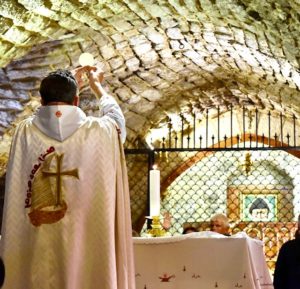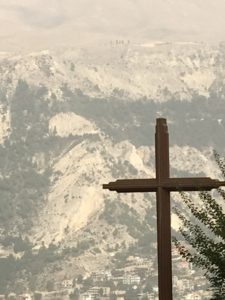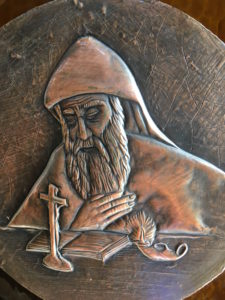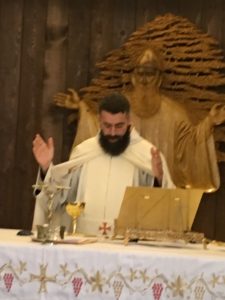
at the Monastery of St. Charbel, Annaya, Lebanon
How blessed we are to be in the presence of one of Jesus’s very close friends. The life of St. Charbel is enigmatic, so unusual, and contradicts our expectations of saints like Padre Pio, whose holiness was obvious to many. But Saint Charbel lived a hidden life of union with God; he lived only the essentials of what it means to be a child of God.
In his Letter to the Ephesians, St. Paul says that we are called to be and destined to be a child of God and to be his intimate true friend. He writes, “In love, he destined us for adoption to himself through Jesus Christ, in accord with the favor of his will, for the praise of the glory of his grace that he granted us in the beloved.”
That is our destiny. People often wonder what God’s will is for their life. In one word God’s purpose for our life – is Love. Be open to what God has to present to you at each moment. We don’t have to look for anything else. Loving in a hidden way is sufficient.
Saint Paul continues the we were chosen “so that we may exist for the praise of His glory.” We’re called to worship the Blessed Trinity. Whatever our state of life is, our primary purpose is that we do everything for the praise of His glory.

In the Gospel of Luke, Jesus tells us that ‘not one sparrow has escaped the notice of God.’ No act of love and true humility escapes God’s notice. Be aware that the divine presence is in your heart. We must find Him there. Seek first the praise of His glory and His face in your own life.
In our pursuit of the kingdom of God, Jesus warns us to “Beware of the leaven – the hypocrisy – of the Pharisees. He warns us not be fake friends and the model that juxtaposes against those who are his real friends are the Pharisees and their hypocrisy.
Jesus also tells His disciples, “There is nothing concealed that will not be revealed nor secret that will not be known.” There is nothing hidden. We can’t live a double life, putting on a good life on the outside only. Jesus calls us to an authenticity of love, which first comes from our personal recognition that ‘I can’t do it on my own.’
Without God’s grace, none of us can fully live up to the perfect love we are called to, or allow His indwelling spirit to live in us. Grace and complete humility is what makes St. Charbel’s life so fruitful.
The hidden union he had in his heart was life- giving after he passed from this world. In this life, though the secret intimacy he shared with Jesus went unnoticed, when he went to heaven, he became a fountain of miracles for God.
St. John of the Cross writes that in the spiritual marriage, a totally flourishing friendship with God comes alive, and God chooses each of us to fully share in this intimacy.
When we kneel before Saint Charbel, we praise and glorify God for what He has done in St. Charbel. God can accomplish far more than we can imagine, provided that we allow him. We are all called to share in the fullness of his divinity. St. Charbel is that witness to our day and age. He models the spiritual marriage here and now, giving us the confidence that Jesus is capable of doing today what He did in the ancient days.
One of the main reasons it is appropriate to begin a pilgrimage by honoring Saint Charbel, is to help us to prepare our encounter in Jesus’s footsteps. By his very witness and presence, Saint Charbel is a bridge that unites the East and the West. He was a contemporary monk who lived the same contemplative spirit of St. Elijah in this Holy Land.
Saint Charbel calls us to discover our own roots and identity. He embodies, especially for Carmelites, the zeal for the absolute primacy of God’s love. As we come before the altar, we already share in this future glory through the Holy Spirit and the sacrament of the Mass. In the Spirit, the food of the Eucharist is a divine medicine that already gives us a foretaste of the reality that we are God’s possession.
We are all created to be possessed by God’s eternal love. In allegiance to Jesus with Saint Elizabeth of the Trinity and Saint Charbel, may all of us come to know how to live a hidden life of love for the praise of his glory.

NOTE: Father Robert Elias Barcelos, OCD is currently leading a Holy Land Pilgrimage, organized by Beth Maddatu, ocds and Adriatic Tours. I have loosely transcribed his homilies so that readers can participate in the journey. – Teresa Linda, ocds



